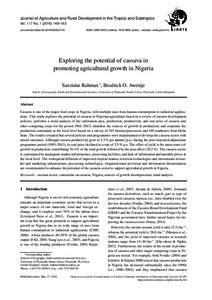Aufsatz

Exploring the potential of cassava in promoting agricultural growth in Nigeria
Zusammenfassung
Cassava is one of the major food crops in Nigeria, with multiple uses from human consumption to industrial applications. This study explores the potential of cassava in Nigerian agriculture based on a review of cassava development policies; performs a trend analysis of the cultivation area, production, productivity, and real price of cassava and other competing crops for the period 1961–2013; identifies the sources of growth in production; and examines the production constraints at the local level based on a survey of 315 farmers/processors and 105 marketers from Delta State. The results revealed that several policies and programmes were implemented to develop the cassava sector with mixed outcomes. Although cassava productivity grew at 1.5% per annum (p.a.) during the post-structural adjustment programme period (1993–2013), its real price declined at a rate of 3.5% p.a. The effect of yield is the main source of growth in production, contributing 76.4% of the total growth followed by the area effect (28.2%). The cassava sector is constrained by inadequate market infrastructure, processing facilities, and lack of information and unstable prices at the local level. The widespread diffusion of improved tropical manioc selection technologies and investments in market and marketing infrastructure, processing technologies, irrigation/water provision and information dissemination are recommended to enhance the potential of the cassava sector to support agricultural growth in Nigeria.
Zitierform
In: Journal of Agriculture and Rural Development in the Tropics and Subtropics. Kassel : Kassel University Press. - Vol. 117, No. 1 (2016), S. 149-163Sammlung(en)
Vol 117, No 1 (2016) (Journal of Agriculture and Rural Development in the Tropics and Subtropics (JARTS))Zitieren
@article{urn:nbn:de:hebis:34-2016050350174,
author={Rahman, Sanzidur and Awerije, Brodrick O.},
title={Exploring the potential of cassava in promoting agricultural growth in Nigeria},
year={2016}
}
0500 Oax 0501 Text $btxt$2rdacontent 0502 Computermedien $bc$2rdacarrier 1100 2016$n2016 1500 1/eng 2050 ##0##urn:nbn:de:hebis:34-2016050350174 3000 Rahman, Sanzidur 3010 Awerije, Brodrick O. 4000 Exploring the potential of cassava in promoting agricultural growth in Nigeria / Rahman, Sanzidur 4030 4060 Online-Ressource 4085 ##0##=u http://nbn-resolving.de/urn:nbn:de:hebis:34-2016050350174=x R 4204 \$dAufsatz 4170 7136 ##0##urn:nbn:de:hebis:34-2016050350174
<resource xsi:schemaLocation="http://datacite.org/schema/kernel-2.2 http://schema.datacite.org/meta/kernel-2.2/metadata.xsd"> 2016-06-13T08:34:57Z 2016-06-13T08:34:57Z 2016-05-27 1612-9830 2363-6033 urn:nbn:de:hebis:34-2016050350174 http://hdl.handle.net/123456789/2016050350174 eng Kassel University Press Urheberrechtlich geschützt https://rightsstatements.org/page/InC/1.0/ cassava sector constraints on cassava Nigeria sources of growth decomposition trend analysis 630 Exploring the potential of cassava in promoting agricultural growth in Nigeria Aufsatz Cassava is one of the major food crops in Nigeria, with multiple uses from human consumption to industrial applications. This study explores the potential of cassava in Nigerian agriculture based on a review of cassava development policies; performs a trend analysis of the cultivation area, production, productivity, and real price of cassava and other competing crops for the period 1961–2013; identifies the sources of growth in production; and examines the production constraints at the local level based on a survey of 315 farmers/processors and 105 marketers from Delta State. The results revealed that several policies and programmes were implemented to develop the cassava sector with mixed outcomes. Although cassava productivity grew at 1.5% per annum (p.a.) during the post-structural adjustment programme period (1993–2013), its real price declined at a rate of 3.5% p.a. The effect of yield is the main source of growth in production, contributing 76.4% of the total growth followed by the area effect (28.2%). The cassava sector is constrained by inadequate market infrastructure, processing facilities, and lack of information and unstable prices at the local level. The widespread diffusion of improved tropical manioc selection technologies and investments in market and marketing infrastructure, processing technologies, irrigation/water provision and information dissemination are recommended to enhance the potential of the cassava sector to support agricultural growth in Nigeria. open access In: Journal of Agriculture and Rural Development in the Tropics and Subtropics. Kassel : Kassel University Press. - Vol. 117, No. 1 (2016), S. 149-163 Rahman, Sanzidur Awerije, Brodrick O. Gedruckte Ausg. im Verlag Kassel Univ. Press (www.upress.uni-kassel.de) erschienen. </resource>
Die folgenden Lizenzbestimmungen sind mit dieser Ressource verbunden:
Urheberrechtlich geschützt

